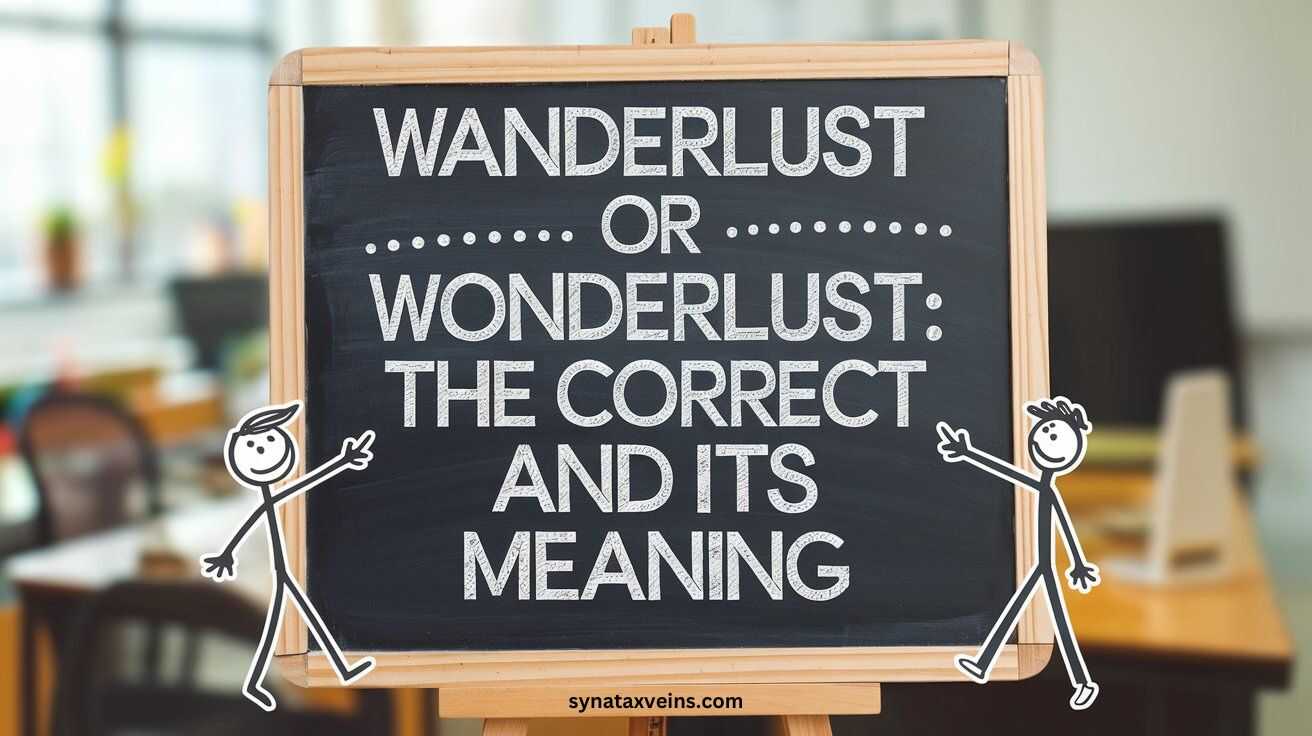Have you ever felt an overwhelming travel urge, a deep craving to leave everything behind and explore new places? If so, you’re experiencing something called wanderlust but some mistakenly refer to it as “wonderlust.” So, which one is correct? What causes this deep desire to explore, and why do so many people experience it?
In this article, we’ll clarify the difference between wanderlust and “wonderlust,” dive into the psychological meaning of wanderlust, explore how it impacts mental health, and share ways to embrace your love for adventure.
What Is the Correct Word: Wanderlust or Wonderlust?
The correct term is wanderlust, not “wonderlust.” The word wanderlust meaning comes from German, where “wandern” means “to hike or roam,” and “Lust” means “desire.” Together, the word perfectly describes a travel passion—the intense longing to explore and experience new cultures, places, and adventures.
On the other hand, “wonderlust” is not a real word in the English language. Many people mistakenly use it because “wonder” relates to curiosity and amazement, which are emotions commonly tied to travel. However, it does not refer to the specific nomadic lifestyle or travel addiction that wanderlust conveys.
Understanding Wanderlust
Wanderlust lifestyle is more than just wanting to take a vacation. It’s a deep-rooted exploration drive that compels people to seek out new adventures, whether that means traveling across the world or simply discovering hidden travel gems in their own country.
People with a strong wanderer mindset constantly seek discovery thrill and world exploration, eager to embrace scenic destinations and unfamiliar landscapes. They don’t just travel for fun they do it to learn, to grow, and to experience life to the fullest.
How Wanderlust Affects Modern Travelers
With the rise of digital nomads and remote work, more people are embracing the wanderlust lifestyle. Instead of settling in one place, they continuously travel, discovering new cultures and making the world their home.
Is Wonderlust a Real Word?
No, “wonderlust” is not a legitimate word in the English language. It likely became popular due to its similarity to wanderlust and the word “wonder.” While cultural exploration and curiosity are connected to travel, “wonderlust” does not correctly describe the journey longing or adventure craving that fuels true wanderlust.
If you want to express a travel passion or trip motivation, always use wanderlust, the recognized term for a powerful desire to explore.
The Psychological Meaning of Wanderlust
Why do some people have an intense travel addiction while others are content staying in one place? The answer lies in psychology. Our brains are wired to crave new experiences, and for some, that craving becomes a lifelong pursuit of transformative trips.
1. Dopamine and the Love for Novelty
At the core of wanderlust is travel dopamine a chemical in our brain responsible for pleasure and motivation. Studies show that novelty activates dopamine pathways, making new experiences exciting and rewarding.
This explains why adventure seekers always crave something new. They thrive on variety, from scenic destinations to thrilling global adventures, as each trip brings a fresh burst of excitement.
2. The Desire for Freedom
Many people travel to escape routine, seeking travel freedom from daily responsibilities. The idea of being on the road, meeting new people, and experiencing different cultures provides a sense of liberation.
This is why road trips, backpacking, and long-term travel appeal to those with a restless explorer’s heart. Wanderlust and mental health are closely linked, as the ability to break free from constraints can reduce stress and increase happiness.
3. Seeking Meaning and Self-Discovery
For some, life-changing travel isn’t just about fun it’s a journey of self-discovery. Traveling to different countries, immersing in new cultures, and stepping out of one’s comfort zone leads to personal growth and meaningful journeys.
This explains why people often return from trips with a new perspective on life, realizing how much they’ve grown through the experiences.
READ MORE >>> HBU Meaning in Text, and How to Use It (Snapchat and Slang Edition)
Why Do People Mistakenly Use Wonderlust?
Despite being incorrect, “wonderlust” continues to appear online and in conversations. Here’s why:
- Phonetic similarity – “Wonderlust” sounds similar to wanderlust, leading to confusion.
- The association with wonder – Many believe “wonder” captures the excitement of travel inspiration and cultural immersion, but it’s still not the right word.
- Social media influence – Misinformation spreads easily, making people believe “wonderlust” is correct when it’s not.
Wonderlust meaning
“Wonderlust” is not a real word. Many people mistakenly use it instead of wanderlust, thinking it refers to a love for wonder and exploration.
The correct term, wanderlust, comes from German and describes a deep travel urge or a strong desire to explore new places. It reflects an adventure craving and a passion for world exploration.
If you’re looking for a word that expresses curiosity and amazement, “wonder” is the right choice. But when talking about a love for travel, wanderlust is the correct term! 🌍✈️
How to Embrace Your Wanderlust
If you constantly feel the pull of world exploration, here are practical ways to satisfy your trip motivation and make the most of your wanderlust lifestyle:
1. Plan Regular Getaways
Even if you can’t take a long vacation, weekend trips and short adventures can fulfill your journey longing. Explore nearby scenic destinations or take road trips to refresh your mind.
2. Explore Hidden Gems Near You
Not all travel passion requires international flights. Many hidden travel gems are just a drive away. Discover historical towns, national parks, and cultural sites in your own state.
3. Read Travel Books and Blogs
Get travel inspiration by reading about others’ experiences. Books and travel blogs can introduce you to incredible destinations and help you plan your next adventure.
4. Follow Travel Influencers
Many adventure seekers share their experiences on social media, offering insights into destinations, budget travel tips, and nomadic lifestyle inspiration.
5. Immerse Yourself in Different Cultures
You don’t have to travel far to experience cultural exploration. Visit ethnic restaurants, attend international festivals, or learn a new language to connect with different cultures.
The Impact of Wanderlust on Mental Health
There’s a strong connection between wanderlust and mental health. Traveling isn’t just about fun it’s a powerful way to improve emotional well-being.
1. Reduces Stress and Anxiety
A change in environment helps reset the mind. Whether it’s a peaceful beach or an adventurous mountain trek, scenic destinations can provide relaxation and stress relief.
2. Boosts Creativity
Experiencing different cultures, art, and landscapes inspires personal growth and enhances creativity. Many artists, writers, and musicians find inspiration through global adventures.
3. Enhances Happiness and Fulfillment
Studies show that spending money on meaningful journeys rather than material possessions leads to greater happiness. Travel creates lasting memories and a sense of fulfillment.
4. Encourages Social Connections
Traveling connects people. Whether meeting fellow travelers or engaging with locals, it fosters friendships and enriches cultural understanding.
Famous Quotes About Wanderlust
Looking for travel inspiration? These quotes capture the essence of wanderlust:
- “Not all those who wander are lost.” – J.R.R. Tolkien
- “To travel is to live.” – Hans Christian Andersen
- “A journey is best measured in friends, rather than miles.” – Tim Cahill
Frequently Asked Questions
What Does Wonderlust or Wanderlust Mean?
The correct word is wanderlust, not “wonderlust.” Wanderlust meaning comes from German, combining “wandern” (to hike or roam) and “Lust” (desire), referring to an intense travel urge or a strong desire to explore the world. “Wonderlust” is a common misspelling and not a recognized word in English.
What Is a Wanderlust Person?
A wanderlust person is someone with an insatiable passion for exploring new places and experiencing different cultures. They thrive on adventure craving, enjoy spontaneous travel, and often seek a nomadic lifestyle. These adventure seekers are always looking for their next travel inspiration and love the thrill of global adventures.
Is Wanderlust a Slang Word?
No, wanderlust is not slang. It is a legitimate English word borrowed from German and is widely used to describe a deep longing for travel and world exploration. However, it is often used informally in social media and travel communities to express a strong journey longing.
Is Wanderlust a Good Word?
Yes! Wanderlust is a positive word that represents curiosity, adventure, and a love for travel. It signifies a travel passion that many people embrace as a lifestyle. However, too much travel addiction without balance can lead to restlessness or a constant feeling of dissatisfaction with staying in one place.
What Is Travel Love Called?
A deep love for travel is often described as wanderlust or Fernweh (a German word meaning “far sickness,” or the longing to be somewhere far away). Other terms like travel urge, exploration drive, or vacation dreams also capture the feeling of wanting to constantly explore new destinations.
Is It Fernweh or Wanderlust?
Both Fernweh and wanderlust relate to travel, but they have slightly different meanings. Wanderlust refers to the excitement and adventure craving for new experiences, while Fernweh describes a deep emotional longing to be far from home, almost like homesickness for places you haven’t visited yet.
Both words capture the beauty of meaningful journeys and the irresistible pull of world exploration! 🌍✈️
Conclusion
Now that you know the difference between wanderlust and “wonderlust,” you can confidently use the correct word while embracing your desire to explore. Whether you’re planning your next world exploration, seeking cultural immersion, or simply enjoying the thrill of new experiences, let your wanderlust lifestyle guide you toward unforgettable adventures.

